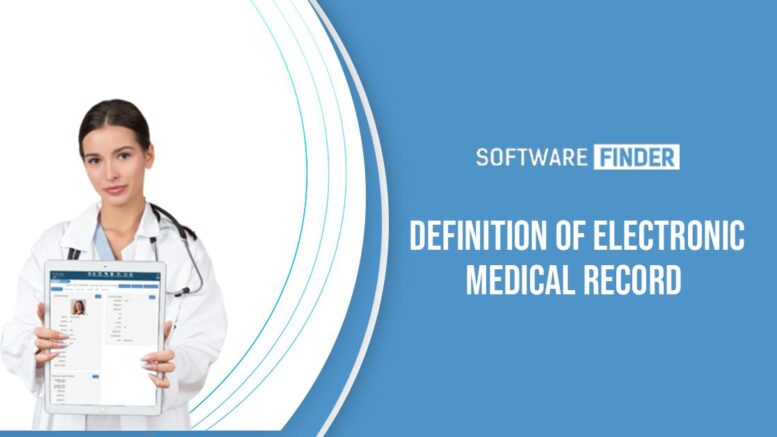The success of a healthcare practice depends on selecting the appropriate EMR software, which you can learn about in this article. With the aid of Software Finder, find out about important considerations and leading companies like Allscripts, MEDITECH, Athenahealth, Greenway Health, and Kareo.
What is Electronic Medical Record
An Electronic Medical Record (EMR) is a digital version of a patient’s medical history, containing information on the patient’s diagnoses, treatments, medications, allergies, immunizations, laboratory test results, and other relevant health information. EMRs like Allscripts, MEDITECH, Athenahealth EMR, Greenway Health, Kareo, etc are designed to improve patient care by providing healthcare providers with easy access to accurate and up-to-date medical information and facilitating communication and collaboration among healthcare professionals. EMRs can be accessed by authorized healthcare providers from multiple locations and are typically stored securely on a centralized electronic database.
EMRs are designed to improve patient care by providing healthcare providers with accurate and up-to-date information and facilitating communication and collaboration among healthcare professionals.
Benefits of EMRs:
- Improved patient Care: EMRs help improve patient care by providing healthcare providers easy access to accurate and up-to-date medical information. This information allows healthcare providers to make informed decisions about patient care, leading to better patient outcomes.
- Increased Efficiency: EMRs improve efficiency by reducing the need for paper-based records, eliminating duplicate tests and procedures, and streamlining administrative tasks.
- Enhanced Communication: EMRs facilitate communication and collaboration among healthcare professionals, improving the quality of patient care.
- Improved Patient Safety: EMRs can help to improve patient safety by providing healthcare providers with alerts for potential drug interactions, allergies, and other medical issues.
- Cost Savings: EMRs can help to reduce healthcare costs by eliminating the need for paper-based records, reducing administrative tasks, and minimizing errors and duplication.
Costs of EMRs:
The costs of implementing an EMR system can vary depending on the size of the practice and the specific needs of the practice. Some of the costs associated with EMRs include:
- Hardware and Software: Practices must purchase the necessary hardware and software to support an EMR system.
- Implementation Costs: Practices must hire IT professionals to install and configure the EMR system.
- Training Costs: Practices must train their staff to use the new system.
- Maintenance Costs: Practices must budget for ongoing maintenance and updates to the EMR system.

Choosing the right EMR software for a healthcare practice
EMR software solution offers unique features, benefits, and pricing structures. Choosing the right EMR software for a healthcare practice requires careful consideration of the practice’s size, specialty, workflow, and budget. If you are looking for an EMR for your practice, contact Software Finder on email info@softwarefinder.com.
Let’s look at a few of the new EMRs in the market.
Allscripts:
Allscripts offers a range of EMR software solutions for different healthcare settings, including hospitals, clinics, and physician practices. Its software features include electronic prescribing, Patient portals, and telemedicine capabilities. Allscripts is known for its scalability, flexibility, and ability to integrate with other healthcare systems.
MEDITECH:
MEDITECH EHR provides EMR software solutions for hospitals and healthcare organizations. Its software features include clinical decision support, patient portals, and mobile access. MEDITECH is known for its customizable workflows, comprehensive features, and intuitive interface.
Athenahealth:
Athenahealth offers cloud based EMR software solutions for small to mid-sized practices. Its software features include patient engagement tools, e-prescribing, and billing and coding support. Athenahealth is known for its ease of use, affordability, and fast implementation process.
Greenway Health:
Greenway Health provides EMR software solutions for practices of all sizes. Its software features include clinical decision support, patient engagement, and billing and scheduling tools. Greenway Health is known for its user-friendly interface, comprehensive features, and ability to integrate with other healthcare systems.
Kareo:
Kareo offers EMR software solutions for small practices. Its software features include e-prescribing, patient portals, and telemedicine capabilities. Kareo is known for its affordability, ease of use, and comprehensive features designed specifically for small practices.
Conclusion
Choosing the right EMR software for healthcare practice can be daunting, but it’s crucial for the practice’s success. Factors to consider include the practice’s size, specialty, workflow, and budget. EMR software providers like Allscripts, MEDITECH, Athenahealth, Greenway Health, and Kareo offer unique features, benefits, and pricing structures that can cater to different healthcare settings. It’s important to carefully evaluate each provider and their software solutions to find the best fit for the practice’s needs. Contacting Software Finder can help simplify the process and ensure the practice finds the right EMR software for their needs.
